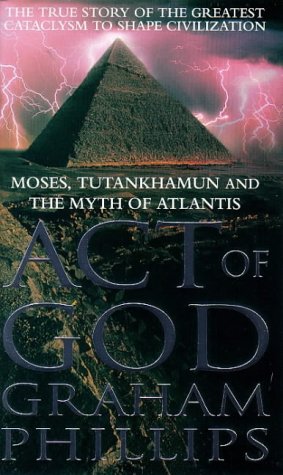

Full description not available
M**E
book in good condition
very pleased
J**N
Value.
Great reading.
D**R
HISTORY REVISITED
This is a typical Graham Philips book. It is contentious but interesting and well worth reading. Biblical research in this field is gaining momentum.
M**X
Act of God
Having read Graham Phillips 'The Marian Conspiracy' and was impressed with his exploration into the history of The Virgin Mary. I wanted to read more. This is about the excavation of a mysterious Egyptian tomb early this century and holds the key to one of the greatest disasters to strike humankind. Strangely sealed, this was a tomb constructed to keep someone or something in. It is skilfully researched and argued.
T**D
One Star
Boring!!!
M**R
Ancient mysteries - solved?
I really found this book very enthralling and thought provoking, the Author Graham Phillips puts forward some fascinating facts about ancient Egypt and "de bunks" a lot of mysteries and fables surrounding the old testament/ Moses and the exodus. I particularly enjoyed the chapters about the ancient eruption of Thera (modern Santorini) and how this links in to the Atlantis legend. A very good read and you don't have to have a university degree in ancient Egyptian history to understand it.
A**R
A very thought-provoking work
I must confess that I stumbled across the works of Graham Phillips by accident. I am extremely glad that I did as the ideas he puts forward are very intriguing. I have deliberately sought out many of his past books as a consequence of both this fact and the sheer verve (not a word normally associated with this type of work) of his writing style. This trend continues with Act of God which manages to bring various strands of historical research together to form a concise, well-reasoned argument for the truth about Moses, the Exodus, Akhenaten, the Great Plagues of Egpyt and the parting of the Red Sea. I have also had the very great pleasure of hearing him speak at several conventions in which it can only be said that he can inform and entertain at the same time (a rare gift). The man is a national treasure.
A**N
Interesting theories undermined by ignorance of Palestinian archaeology
This book sets out to investigate the truth- if any- behind the Biblical story of the Exodus, relating it to the life of the monotheistic pharaoh Akhenaten. The author clearly knows a lot about ancient Egypt and has done some interesting detective work. Unfortunately his theories are undermined by his lack of knowledge concerning the archaeology of ancient Palestine and the textual analysis of the Old Testament. He presents a revolutionary take on the Egyptian records, but takes the Biblical account at face value. He initially admits that there is no archaeological evidence for the Exodus, and no textual evidence outside of the Biblical account, which was written about 800 years after the event. He then launches into his theorising along the lines of “but if it had happened, then here’s how it could have been.” Phillips could make a good start by checking out “The Bible Unearthed” by Finkelstein and Silberman, who are both highly respected Israeli Jewish archaeologists, and also “The Invention of Ancient Israel” by Keith Whitelam. These studies show that the Exodus story was entirely mythical, created for ideological/religious reasons, not as an account of historical facts. Not only is there no evidence that the Exodus ever happened, there is copious evidence that it did not happen. The Sinai desert could not have supported even a small nomadic tribe before camels had been domesticated, let alone hundreds of thousands for 40 years. Palestine was all under Egyptian control anyway, so the Israelites could not have escaped from Egypt by going there. The cities which Joshua supposedly destroyed were either not destroyed at that time, or else did not even exist. The Canaanites whom he supposedly exterminated not only survived into subsequent ages, but totally dominated the Israelites insofar as the Israelites can be traced at all. In fact there’s scarcely any mention of Israel outside of the Bible before the time of King Omri, who features in the Book of Kings, centuries after the date of the “Exodus.” Phillips suggests convincingly that the eruption of Thera could account for the Plagues of Egypt. However once again there’s n oevidence for these plagues outside of the Bible, and while they ash plume could have hit Egypt, it’s at least equally likely that it didn’t (Egypt is a narrow target, since the population is confined to the Nile Valley, and we don’t know the exact wind direction which would have made all the difference). But Phillips then asserts that the Pharaoh was so horrified by the plagues of Egypt that he converted to the Israelite monotheistic religion! Firstly, there’s no record of such a conversion anywhere in human history. Pharaoh was the God-King of a Superpower, while the Israelites were a primitive nomadic tribe! And in any case, Phillips is clearly unaware that the Israelite religion up until the time of King Josiah, centuries after the “Exodus”, was never monotheistic anyway! The Israelites worshipped at least two divinities, namely the God Yahweh and his consort the Goddess Asherah.Modern scientific archaeologists (i.e. those who don’t have some Zionist or Christian Fundamentalist axe to grind) agree that the Israelites gradually emerged as a separate people from among the indigenous inhabitants of Palestine whose ancestors had been living there for about 40,000 years, ever since humans first entered that region. There was never any Exodus as described in the Bible. However, there is some evidence that the Levites (the Israelite priestly tribe) did include a significant Egyptian element, who could indeed have been descended from the exiled diehards of Akhenaten’s monotheistic cult. That would be a different story, much more believable and therefore all the more interesting.
Trustpilot
1 month ago
1 week ago